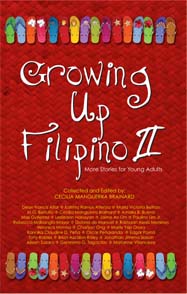
Growing Up Filipino II
I was 10 when someone gave me my first diary. It was small, hard-backed, had a teddy bear on it and, most importantly, a lock. What more could a kid want than a space where she could say anything she wanted? Crushes, rants, dreams, magic, love songs. It was all in there. What my first diary meant to me can be summed up in one delicious word: FREEDOM! I was hooked on recording the details of my life, the soaring search for the right word, playing with poems and stories from that moment onward.
I was one of those kids who loved her English teachers and was wide-eyed with wonder (and a little intimidated!) at these wise-owl women we called librarians. In L.A., in the 1980’s, there really weren’t too many stories with Filipino or Filipino American kids on the bookshelves. In third or fourth grade, I had an assignment to write a report on my heritage. When I went to the public library, the librarian wasn’t able to find any books that mentioned Filipino culture. She shook her head sympathetically. The invisibility of my culture in books sank into my consciousness quietly, stealthily. Because I never saw an author of my heritage, I’d assumed that people like me didn’t have any worthwhile stories. Hey, if my beloved English teachers and the wise librarians didn’t have stories of families like mine on the shelves, the stories couldn’t possibly exist, right? Kid logic.
So I wrote, secretly. I was a writer before I even had a word for it. No one in my family and no one we knew wrote stories. The grown-ups in my family were all nurses and navy men, vendors at sari-sari stores, and med techs who worked long hours and relaxed by watching TV and movies and feasting at potlucks. No books for pleasure, only text books for saving patients’ lives. I thought I was weird for writing my stories and kept my weirdness private. But, man, the joy of locking my bedroom door, curling up on my window-seat with flowery cushions, turning on the radio, and letting my black felt-tip pen glide in loops and swoops across the page!
The first time I ever met a Filipino writer, I was already 19, studying at UCLA, and firmly convinced we had no stories. It was one of the most awesome moments of my life to learn, at last, that someone from my background was an author. His existence showed me that dreams are possible (and that, perhaps, I wasn’t so weird after all). The writer happened to be N.V.M. Gonzalez, who is considered a national treasure and one of the founders of literature in the Philippines. He was also a keen teacher who respected his young students greatly. N.V.M. didn’t make a big deal about himself. Humble, like the characters in his short stories.
So it’s with the greatest pleasure that I share with you all the U.S. launch of the anthology Growing Up Filipino II, edited by Cecilia Manguerra Brainard. Cecilia is tireless in publishing stories from the Filipino diaspora — a fancy word that simply means my sea-faring, adventurous, and hard-working community has traveled and settled around the world. It’s filled with 27 stories from writers of Filipino descent who grew up in the Philippines, the United States, and Canada. There are wonderful writers like Marianne Villanueva, Paulino Lim, Jr., and Cecilia Brainard. One of my own YA short stories, “Shiny Black Boots,” is included in Growing Up Filipino II. And I count myself lucky to be in such fantastic literary company.
I think the me who was the L.A. Valley Girl in the 1980’s would have loved to see Growing Up Filipino II on the bookshelves. I wouldn’t have had to wait so long to learn that we, too, had stories worth reading. And to my friends who, also, never knew that Filipino stories existed, this is a great time to introduce them to your teens. As a kid I loved Scott O’Dell’s Island of the Blue Dolphins and Elizabeth George Speare’s The Witch of Blackbird Pond. Stories of survival and resourcefulness, creating bonds of friendship, and taking care of your family are universal. James Baldwin said it best in his 1984 Paris Review interview: “Your self and your people are indistinguishable from each other, really, in spite of the quarrels you may have, and your people are all people.”
– MGB
